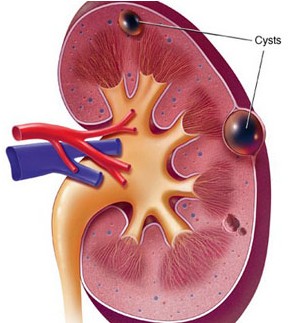
A cyst refers to a closed pouch or sac filled with air or liquid. One or more may form within the kidneys. As people get older, cysts can form on the surface or in the nephrons of the kidneys. They can range in size from a small pea to as large as a grapefruit. Cysts can also grow over time. Any question about your disease? Feel free to Contact Us.
Causes
Toxins. The toxins may cause damage to a variety of cells and organs, thus inducing disease. In serious conditions, the disease may be life-threatening.
Congenital dysplasia. Kidney Cysts may present at people's birth. Congenital dysplasia can cause Medullary Sponge Kidney, PKD, etc. Normally, there is no abnormalities of the genes.
Bad dietary habit. Unhealthy dietary habit may cause many diseases including Kidney Cyst.
Exams and Tests
• Imaging tests.
These tests can be used to investigate simple renal cysts as well as help doctors determine whether a kidney mass is a cyst or a tumor. They include:
Ultrasound of the kidneys. A transducer, wand-like device, is placed on the body. It can emit inaudible sound waves that are reflected back to the transducer - like sonar. A computer translates the reflected sound waves into images of the kidneys. The images allow the doctors to see the size and number of cysts.
CT scan. It is a diagnostic procedure that uses special X-ray equipment to create cross-sectional pictures of the body. The images are produces using X-ray technology and powerful computers. As people lie still on a table, the table slowly passes through the center of a large X-ray machine. This test is painless.
MRI. During the procedure, people lie inside a large cylinder, magnetic fields and radio waves generates cross-sectional views of the kidneys.
• Kidney function tests
A sample of the blood is tested to detect whether a kidney cysts is damaging patient's kidney function.
Prognosis
Generally, renal cysts are not harmful unless they cause extreme pain or grow to an unusually large size and pressing against other organs or nerves. Conventionally, doctors take a "wait and see" approach to treatment.
Simple kidney cysts progress slowly and the outlook is good. Individuals with no overt symptoms do not need to take medications or receive surgery. The disease may not affect patients' daily life. They only need to have B ultrasound examination once half a year or once a year.
Cases that need to get treatment are:
1. Pain in the back or abdomen or with high level of mental stress;
2. The size of cyst is greater than 4cm, or it obviously increases recently;
3. The cyst suppresses other organs, or with symptoms like hydronephrosis, infection, rupture, etc;
4. Be suspicious of canceration.
If you would like to get more information or have any problem in managing your Kidney Cyst, feel free to chat with our online doctor!
Make An Appointment or Referral Today
Please call Viber or Whatsapp: or email to (Monday through Sunday)
to make an appointment or request an Online Doctor Consultation

Kidney Cysts are small to large masses that grow on one or both kidneys. Symptoms of this disease vary according to the type. Usually, in simple cases, no symptoms are observed.
In case of Simple Kidney Cyst, some patients may present other signs that are usually observed when the cyst grows in size. They include:
• Frequent urinary tract infection
• Pain in upper abdomen, or back
• Fever, and chills
In case of Complex Kidney Cyst, patients may experience many different symptoms, such as:
• Urinary tract infection
• Hematuria, or Blood in Urine
• Headache
• Pain of abdomen or lower back
• Hypertension, or High Blood Pressure
• Frequent urination
• Fever
At times, these cysts rupture resulting in minor or severe symptoms including:
• Blood in urine (hematuria)
• Back and abdominal pain
• Pain in waist and hips
• Sepsis
• Hemorrhage
Bursted kidney cysts, in serious conditions, can result in obstructed blood flow in certain parts of the kidney; leading to damage. Hence, it is essential to treat is as early as possible.
Kidney Cyst can be treated effectively with the help of different treatment options. It is just important to consult the doctor instantly if you suffer from any of the aforementioned symptoms. Or, feel free to Contact Us for free advice.
Make An Appointment or Referral Today
Please call Viber or Whatsapp: or email to (Monday through Sunday)
to make an appointment or request an Online Doctor Consultation

Because our center is one of the nation's most-active programs, with a reputation as a leading center for Kidney Cyst treatment, we have a remarkable level of expertise and experience with this disease.
While many kidney doctors see only a couple of cases of this type of disorder, we treat hundreds each year. This experience is backed by a long history of developing treatments for Kidney Cyst. And we are leading toward the future by investigating new ways to treat a variety of kidney diseases. At our center, you are following closely by a team of medical stuff that includes kidney experts, nurses, dietitians, and many other specially trained support specialists. They collaborate closely and personalize your care to fit your unique situation.
If you or your beloved one has been diagnosed with Kidney Cyst, our kidney doctors will discuss the best treatment option. One or more of the therapies as below may be recommended to treat your kidney disease.
Micro-Chinese Medicine Osmotherapy
As an innovative traditional herbal medicine, Micro-Chinese Medicine is an external application with no side effect. Curative effects for Kidney Cyst include:
- Stop the growth of cyst in the kidney. Through restrain the section of cystic fluid and inhibit the proliferation of epithelial cells, the further enlargement of cyst can be prevented.
- Shrink the cyst gradually. It will become smaller and smaller. Once disappear, the cyst will never recur.
- Improve kidney function. This is based on the functions of Chinese medicine to anti-inflammation, improve microcirculation, eliminate harmful substances, and privide a favorable milieu for repairing the damaged kidney.
As a new way to treat Kidney Cyst naturally, this remedy gives patients with new hope to live a good, long life. You can make an appointment with our renowned nephrologists to get yourself evaluated for this treatment.
Medicated Bath
Medicated Bath is a natural bath therapy which has been suggested to treat renal cyst since very ancient time. It may help patients to shrink the cyst in size, alleviate symptoms, and reduce elevated blood pressure. If you are interested to get more information about this treatment, feel free to Contact Us.
Traditional Chinese Medicine
Traditional Chinese medicine (TCM) techniques such as acupuncture, herbal medicine, food therapy, qigong, cupping, etc can also be used as complementary treatment for your better recovery from Kidney Cyst.
Make An Appointment or Referral Today
Please call Viber or Whatsapp: or email to (Monday through Sunday)
to make an appointment or request an Online Doctor Consultation

Kidney Cyst are round pouches of fluid that form in the kidneys. This disorder can be associated with serious disorders that may impair kidney function. However, correct dietary arrangement and healthy lifestyle can help slow down the growth of cyst and protect renal function. So, work with your nutritionist to develop a good plan for your situation or make an appointment with renowned nephrologists for personalized advice!
▪ Correct diet. This is a good way to help control the development of Kidney Cyst. The following are some tips for your reference:
- Modify protein intake. Too much protein can make your kidneys work too hard. Eating less protein slows down progressive loss of renal function and also prevents buildup of toxic substances in the body. Eat less meat, cheese, and even a little less of the higher protein beans and legumes like chickpeas and lentils.
- Reduce the amount of sodium. To reduce salt in diet, you can use garlic or onion powder, and other herbs and spices instead of salt. Avoid foods including processed foods like meats, soups, and vegetables that come in cans.
- Eat a diet low in fat and high in fiber. This helps to lower high blood pressure. Your diet can contain plenty of fruits, vegetables, and whole grains.
For the best diet in your situation, feel free to Contact Us.
▪ Well controlled blood pressure. High blood pressure will aggravate Kidney Cyst. With aims to regulate the blood pressure level, you are suggested to eat a meal plan low in sodium and fat; limit consumption of calorie for weight management; and quit smoking.
▪ Relieved stress levels. High stress levels may aggravate the disorder. Doing exercises 30 minutes or more per day help relieve stress. Besides, you can try physical activities that are focused on the body and reducing stress such as Tai Chi, yoga, and meditation.
Make An Appointment or Referral Today
Please call Viber or Whatsapp: or email to (Monday through Sunday)
to make an appointment or request an Online Doctor Consultation

